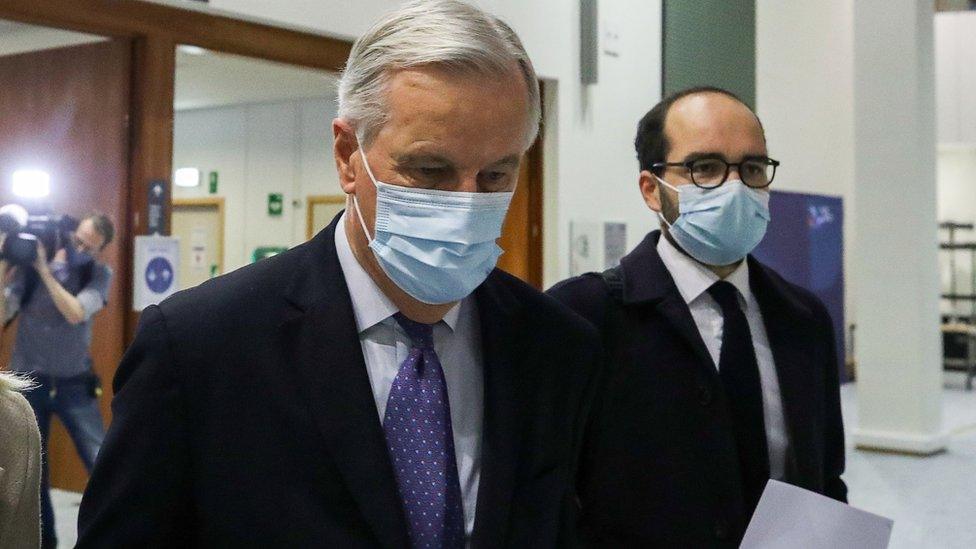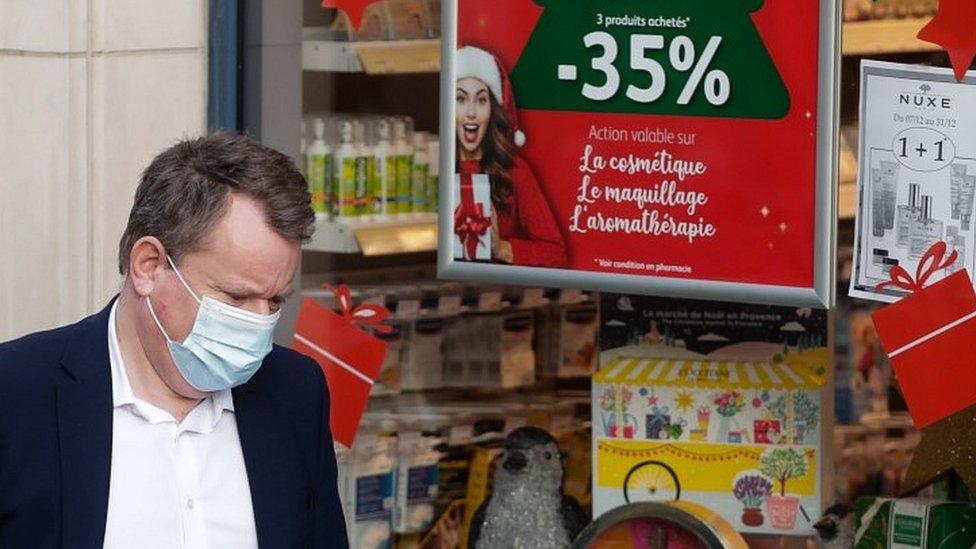Brexit: No trade deal unless 'substantial shift' from EU, UK says
- Published
- comments

The EU's chief negotiator, Michel Barnier, said it was "the moment of truth" for the talks
There will be no post-Brexit trade deal between the UK and EU unless there is a "substantial shift" from Brussels in the coming days, a government source has told the BBC.
It is understood there is likely to be a decision before Christmas on whether or not a deal can be reached.
The two sides have been in negotiations about how many years it will take to phase in new fisheries arrangements.
The EU's Michel Barnier said any deal must be "balanced and reciprocal".
The talks are expected to continue on Monday, a UK government source has said.
Writing on Twitter on Sunday, external, Mr Barnier, the EU's chief negotiator, said the talks were at a "crucial moment" and the two sides were working "hard" to try to narrow their differences.
"We respect the sovereignty of the UK and we expect the same. Both the EU and Britain must have the right to set their own laws and control their own waters. And we should both be able to act when our interests are at stake."
'Flexibility needed'
Whitehall sources say it is increasingly likely the UK will end its post-Brexit transition period without a free trade agreement with the EU, meaning that on 1 January the two sides will rely on World Trade Organization (WTO) rules to govern exports and imports.
This could see tariffs introduced on goods being sold and bought - which may lead to increased prices for certain products.
A government source told the BBC the EU was "still struggling to get the flexibility needed from member states" to make a deal possible.
"We need to get any deal right and based on terms which respect what the British people voted for.
"We're continuing to try every possible path to an agreement, but without a substantial shift from the [European] Commission we will be leaving on WTO terms on 31 December."
'We are ready'
Health Secretary Matt Hancock said an agreement was in both sides' interests "given all the problems that are going on on the continent as well as here" with Covid, but the EU needed to give ground.
"I hope the EU moves on its unreasonable demands, that I don't think anybody could reasonably accept, and then we can get a trade deal," he told the BBC's Andrew Marr.
"But we are ready, whatever's necessary."
Prime Minister Boris Johnson has vowed to keep talking, but warned gaps had yet to be bridged.
Senior MEPs in the European Parliament have said they will not be "rushed" into signing off a deal on their side and want to see the text of any agreement by Sunday if they are to approve it by the end of the year.
A senior EU source told the BBC's Brussels correspondent Nick Beake: "The Member States are the EU. And as a former member state, the UK knows well that the EU negotiator is there to protect the interest of Europeans.
"We believe it is in both sides' interest to reach a fair deal, which cannot be the case without a level playing field and sustainable arrangements for fisheries."
Michel Barnier says negotiations have "just a few hours"
The two sides have been at odds over the length of time it will take to introduce new arrangements once the UK leaves the bloc's Common Fisheries Policy.
The UK, led by its chief negotiator, David Frost, has insisted its sovereign rights over its waters must be respected from day one and its fleets must be able to keep a much larger share of their own catch.
The EU is insisting on a much longer transition period, with guarantees on access and how catches are distributed.
The two sides are reported to have made progress in recent days on the issues of fair competition and what to do if the UK is deemed to get an unfair competitive advantage by moving away from EU rules and standards.
If a deal is reached between the two sides, it would need to be agreed by parliaments in the UK and the European Union's member states.
UK MPs have now finished for the Christmas break, but Cabinet Office minister Michael Gove said on Thursday that they could be called back to ratify a deal in the coming days, were one to be agreed.

The basics
Brexit happened but rules didn't change at once: The UK left the European Union on 31 January 2020, but leaders needed time to negotiate a deal for life afterwards - they got 11 months.
Talks are happening: The UK and the EU have until 31 December 2020 to agree a trade deal as well as other things, such as fishing rights.
If there is no deal: Border checks and taxes will be introduced for goods travelling between the UK and the EU. But deal or no deal, we will still see changes.

- Published19 December 2020

- Published17 December 2020